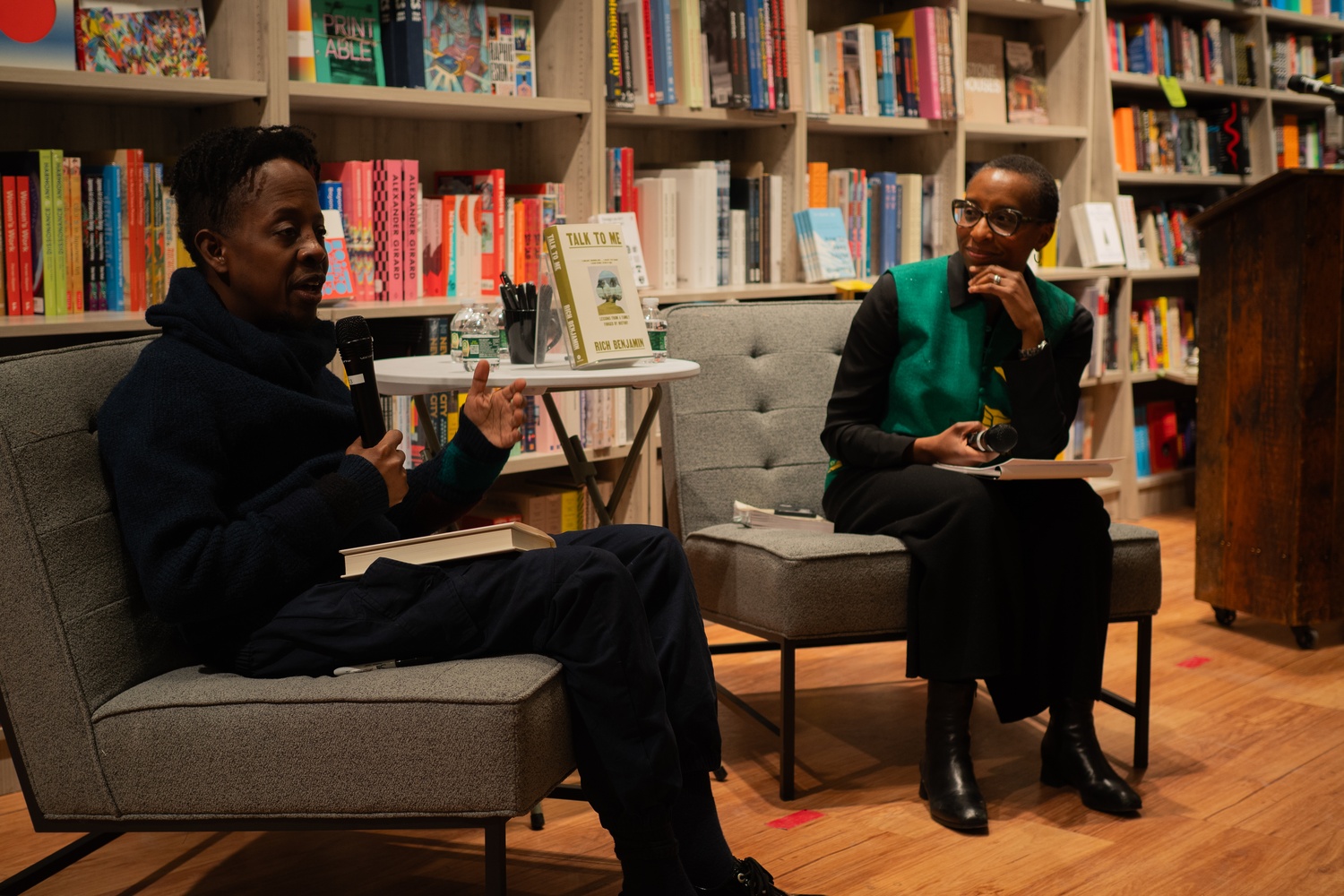
News
Summers Will Not Finish Semester of Teaching as Harvard Investigates Epstein Ties

News
Harvard College Students Report Favoring Divestment from Israel in HUA Survey

News
‘He Should Resign’: Harvard Undergrads Take Hard Line Against Summers Over Epstein Scandal

News
Harvard To Launch New Investigation Into Epstein’s Ties to Summers, Other University Affiliates

News
Harvard Students To Vote on Divestment From Israel in Inaugural HUA Election Survey
Former Harvard President Claudine Gay Moderates Book Talk in Rare Appearance

Former Harvard President Claudine Gay moderated a talk with author and anthropologist Rich Benjamin on Wednesday in one of her first public events since resigning from Harvard’s top post last year.
The book talk was held at Brookline Booksmith in Boston and featured Benjamin’s new memoir on his mother and grandfather Daniel Fignolé, the former president of Haiti.
Before the Wednesday talk — which drew a crowd of around 40 people, including many of Gay’s friends — Gay has stayed out of the public spotlight, addressing Harvard affiliates only once in September to accept an award and deliver a keynote address to the Harvard Black Alumni Association.
After one year on leave, Gay offered a graduate research section in the Government Department for the Spring semester. She also occasionally attends Harvard’s sporting events.
During the talk, Gay — the daughter of Haitian immigrants — praised Benjamin’s memoir for serving as “a light in what is otherwise a really dark moment.”
“It’s such a broad moment, not just in Haiti, where we’re witnessing the collapse of the state, but also for the Haitian diaspora in the United States,” she said.
“My dad, who’s been here for what will be 60 years next month, has taken to carrying his U.S. passport with him everywhere,” Gay added.
Gay described her own upbringing, saying that Benjamin’s depiction of his mother as a strong-willed, generous woman reflected how she thought of her own mother.
“There are also parts of her that, frankly, I recognize as just someone raised by a Haitian mother,” she said. “She’s formidable in ways that I recognize — the ‘stop crying, or I’ll give you something to cry about.’”
Benjamin said his mom “was a woman who preferred to parent the world than to parent her own children,” adding that she spoke little of her humanitarian campaigns across the world.
Gay also praised Fignolé’s legacy in Haiti as an example of effective leadership in a time of crisis.
Haiti “has had a lot of leaders, but very few that have left the kind of indelible imprint on the soul of the country and the diaspora the way your grandfather did,” Gay said.
“I found him, as a political figure, someone easy to admire, but then very difficult to love as a human being,” she added.
Fignolé, a popular labor leader before assuming the presidency, governed Haiti for only 19 days in 1957 before he was deposed by a military coup backed by the U.S. Central Intelligence Agency.
He was kidnapped and taken to New York with his wife, Carmen Jean-François, and later, their seven children who were held captive and physically abused by the Haitian army. In the U.S., the family’s outlook did not improve — Fignolé and Jean-François abused their children, and he later left his family for a younger woman.
Benjamin said he hoped to unravel his family’s complicated history through his book. He said he began researching for his book in 2010 and spent 12 years in legal battles with the federal government to unseal memos from Fignolé held in federal archives.
“I sued the State Department in federal district court and denied, denied, denied — on the fourth time, the fourth appeal, it worked and they unredacted the information,” he said.
Benjamin said he hoped his book would offer Americans an opportunity to realize the depth of the U.S.’ involvement in foreign governments.
“I know most Americans are busy educating, bathing, feeding their children — they’re just living their lives,” Benjamin said. “And they can be discarded from history, and they can be sleepwalking through history, and they cannot appreciate the full agency that they have in history.”
“What you can do to forge history — to me, that’s the relevance of the book,” he added.
Correction: February 20, 2025
A previous version of this article incorrectly stated that Claudine Gay’s Harvard Black Alumni Association address was in October. In fact, Gay delivered the address in September.
—Staff writer Dhruv T. Patel can be reached at dhruv.patel@thecrimson.com. Follow him on X @dhruvtkpatel.
—Staff writer Grace E. Yoon can be reached at grace.yoon@thecrimson.com. Follow her on X @graceunkyoon.
Want to keep up with breaking news? Subscribe to our email newsletter.
